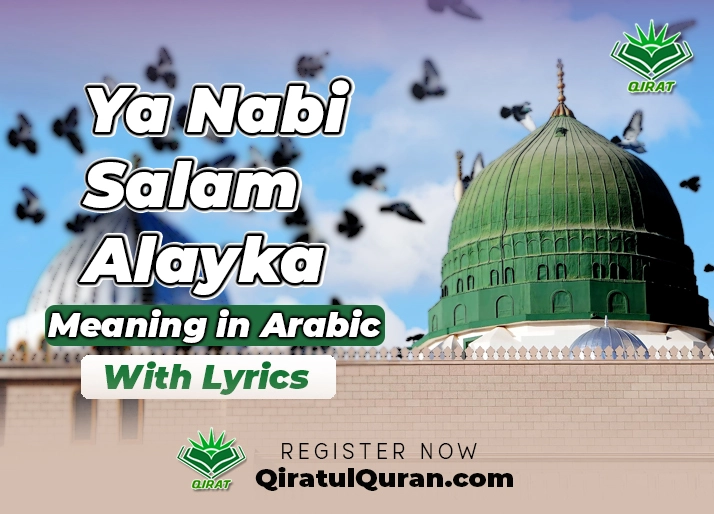
Ya Nabi Salam Alayka Meaning in Arabic
“Ya Nabi Salam Alayka” is an Arabic phrase that holds deep meaning and significance for Muslims worldwide. Translated literally, it means “O Prophet, peace be upon you.” This phrase is used to send blessings and salutations to the Prophet Muhammad S.A.W.
Breaking Down the Meaning
The phrase can be broken down into its parts to understand the full meaning:
Ya
- The word “Ya“ in Arabic is a vocative particle used to call out or address someone. So using “Ya” before “Nabi” indicates that this phrase is addressing the Prophet Muhammad S.A.W directly.
Nabi
- “Nabi” means Prophet in Arabic. So this addresses Muhammad S.A.W as a Prophet and Messenger of Allah.
Salam
- “Salam” means peace. By saying “Salam Alayka,” the caller is wishing peace upon the Prophet.
Alayka
- The word “Alayka” means “upon you.” Adding this makes the phrase mean “Peace be upon you,” directly addressing Prophet Muhammad S.A.W.
So the full Meaning of Ya Nabi Salam Alayka Arabic becomes “O Prophet, peace be upon you.” The phrase encapsulates a heartfelt prayer from the caller to Prophet Muhammad S.A.W., wishing him peace and sending blessings.
Ya Nabi Salam Alayka Lyrics
One of the Beautiful Ya Nabi Salam Alayka Lyrics that we noticed which got many views from past years is that:
يا نبي سلام عليك lyrics
Why Muslims Say Ya Nabi Salam Alayka يا نبي سلام عليك Lyrics
There are a few reasons why Muslims make it a point to invoke blessings and peace upon their beloved Prophet:
Ya Nabi Salam Alaika Recommended in the Quran
- The Quran instructs Muslims to send their prayers and invoke peace upon the Prophet: “Indeed, Allah showers His blessings upon the Prophet, and His angels pray for him. O believers! Invoke Allah’s blessings upon him, and salute him with worthy greetings of peace” (33:56). So Muslims are following Quranic guidance by doing so.
Ya Nabi Salam is a Part of Islamic Etiquette
- Ensuring proper conduct and manners in Islam when addressing sacred personalities like prophets is essential. Saying “Salam Alayka” fulfills the etiquette of addressing Muhammad S.A.W. with the utmost love and respect.
Sending Blessings is Rewarding
- There are many hadiths (sayings of Prophet Muhammad S.A.W) that highlight how reciting this phrase earns great rewards and blessings for the invoker: “Whoever sends blessings upon me once, Allah sends blessings upon him ten times over” (Muslim). So Muslims strive to reap those abundant rewards.
When Muslims Say Ya Nabi Salam & Lyrics
While Muslims can say “Ya Nabi Salam Alayka” at any time to send blessings to their Prophet, there are certain occasions when it takes on special significance:
Ya Nabi Salam During the Call to Prayer
- In the Adhan (call to prayer), the speaker says “Ashhadu anna Muhammadan Rasulullah – I bear witness that Muhammad is the Messenger of Allah.” Upon hearing the Prophet’s name, Muslims invoke blessings and peace upon him.
At Events Commemorating the Prophet’s Life
- During celebrations like the Prophet’s birthday (Eid Milad un Nabi), Muslims gather to praise him and send him many salutations. Mosques and homes come alive with choruses of “Ya Nabi Salam Alayka.”
When His Name is Mentioned
- Whenever Muhammad’s blessed name is mentioned verbally or in writing, Muslims make it a point to say “Sallallahu Alayhi Wasallam” (Peace be upon him) immediately afterward out of honor and love.
So in daily life or special occasions related to the Prophet, Muslims strive to remember him and send their prayers of peace through this phrase.
Different Ways Muslims Say Ya Nabi Salam Alayka
While the root Arabic phrase is “Ya Nabi Salam Alayka,” Muslims across the world have adapted it into different languages and versions:
Assalamu Alayka Ya Rasoolallah
- An extended Arabic version, meaning “Peace be upon you O Messenger of Allah.”
Salawat
- Salawat is the plural of “Salat,” meaning invoking blessings. So reciting Salawat essentially means sending blessings upon the Prophet repeatedly.
Durood Shareef
- Popular in South Asia, Durood Shareef refers to invoking peace and blessings upon Muhammad S.A.W. Long poetry and prose versions exist, like Durood-e-Ibrahim.
Salamun Alaikum Ya Nabiyallah
- A lyrical phrase popularised in Arabic nasheeds (Islamic songs), meaning “Peace be upon you O Prophet of Allah.”
So while the languages and words differ, the essence remains the same – sending utmost respect and blessings to the beloved Prophet Muhammad.
The Etiquette of Saying It
To reap maximum benefit from reciting this phrase, Muslims must be mindful of certain etiquette principles:
Say It Out of Sincerity and Love
- Sincerely feel deep love and reverence for the Prophet in your heart while reciting this blessing. It should not be an empty ritual.
Use Your Best Manners and Conduct
- One should be in a state of ritual purity, dress properly, and use the most respectful tone. Never associate this phrase with anything disrespectful.
Send it Abundantly
- Invoke abundant blessings. Don’t just say it once but repeatedly to reap greater rewards.
Follow It Up With Good Deeds
- Reciting this phrase should inspire one to follow the Prophet’s Sunnah (Way) more closely in their character and deeds.
When said properly with good manners and pure intentions, this phrase connects Muslims with the blessed spirit of Prophet Muhammad and earns divine rewards.
So in short, when a Muslim says “Ya Nabi Salam Alayka,” They invoke the greatest soul created by Allah, Prophet Muhammad S.A.W, with the utmost respect, love, and longing. It epitomizes the honor and devotion Muslims feel towards their Prophet and role model, Muhammad ibn Abdullah (peace be upon him), the final Messenger of Allah.


